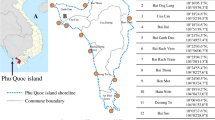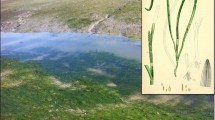Abstract
Beach wrack is a specific challenge for coastal communities around the Baltic Sea region. It is often removed from sandy tourist beaches as part of municipal beach cleaning operations. Some local authorities remove even the smallest amounts of beach wrack to meet perceived public demand for ‘cleaned’ beaches with little regard for any environmental consequences. This research explores the public opinion of beach wrack to determine whether there is, in fact, a demand for its ‘total’ removal from sandy tourist beaches. It explores how the acceptance levels of tourists and residents change depending on the amount of beach wrack present and looks at how people’s knowledge of beach wrack and their experience influences behaviour. For this study, over 700 members of the public were interviewed at sites in 5 different countries across the region. The interviews took place on or near regularly ‘cleaned’ tourist beaches where beach wrack is commonplace. The questions focused on the public’s attitudes towards the aesthetics of different beach wrack amounts. The study shows that while beach wrack does not positively affect most people’s beach experience, small quantities of beach wrack are tolerated. Public perception of beach wrack differs per country, and acceptance of certain amounts is linked to direct, visual, and practical experience. Beach managers can move towards a more sustainable beach wrack policy by desensitising beachgoers to small, unproblematic amounts of beach wrack and by helping to build public knowledge about the important ecosystem services that beach wrack provides.







Similar content being viewed by others
Notes
In the context of this paper, t test refers to t tests with equal variances with a 95% confidence interval.
References
Chubarenko B, Woelfel J, Hofmann J, Aldag S, Beldowski J, Burlakovs J et al (2021) Converting beach wrack into a resource as a challenge for the Baltic Sea (an overview). Ocean Coast Manag, vol. 200
Dahm C (2002) Beach User Values and Perceptions of Coastal Erosion. Environmental Waikato Technical report 2003/03. Environment Waikato Regional Council
Dodds R, Holmes M (2018) Education and certification for beach management: is there a difference between residents versus visitors? Ocean Coast Manag 160:124–132
Domínguez H, Belpaeme K, Tubielewicz A (eds) (2006) Manual beach cleaning in Belgium: an ecological alternative in: Living marine resources and coastal habitats. EuroCoast - Littoral 2006, 131–135
Gössling S (2018) Tourism, tourist learning and sustainability: an exploratory discussion of complexities, problems and opportunities. J Sustain Tour 26(2):292–306
Griffin C (2016) The ecological and economic analysis of beach management strategies in Scotland. Unpublished doctoral dissertation. University of Stirling, Scotland
He M, Blye CJ, Halpenny E (2022) Impacts of environmental communication on pro-environmental intentions and behaviours: a systematic review on nature-based tourism context. J Sustainable Tourism 31:8. https://doi.org/10.1080/09669582.2022.2095392
Heeren A, Singh J, Zwickle AS, Koontz A, Slagle TM, McCreery TM, Less AC (2016) Is sustainability knowledge half the battle? An examination of sustainability knowledge, attitudes, norms, and efficacy to understand sustainable behaviours. Int J Sustain High Educ 17(5):613–632
Hofmann J, Banovec M (2021) Socioeconomic impacts of beach wrack management: baseline report. Report of the Interreg Project CONTRA, Rostock
Jędrzejczak MF, Schernewski, Löser N (eds) (2004) The modern tourist’s perception of the beach: Is the sandy beach a place of conflict between tourism and biodiversity? Coastline Reports, vol 2, 109–119
Kiessling T, Salas S, Mutafoglu K, Thiel M (2017) Who cares about dirty beaches? Evaluating environmental awareness and action on coastal litter in Chile. Ocean Coast Manag 137:82–95. https://doi.org/10.1016/j.ocecoaman.2016.11.029
Marin V, Palmisani F, Ivaldi R, Dursi R, Fabiano M (2009) Users’ perception analysis for sustainable beach management in Italy. Ocean Coast Manag 52(5):268–277. https://doi.org/10.1016/j.ocecoaman.2009.02.001
Möller T, Woelfel J, Beldowski J, Busk T, Chubarenko B, Gorbunova J et al (2021a) Ecological aspects of sustainable beach wrack management. Report of the Interreg Project CONTRA, Tallin
Möller T, Woelfel J, Beldowski J, Busk T, Chubarenko B, Gorbunova J et al (2021b) Environmental aspects of beach wrack removal. Report of the Interreg Project CONTRA, Tallin
Nathaniel H, Franzén D, Lingegård S, Franzén F, Söderqvist T, Gröndahl F (2023) Using stakeholder perceptions to deepen the understanding of beachcast governance and management practices on Gotland, Sweden. Ocean & Coastal Management 239. https://doi.org/10.1016/j.ocecoaman.2023.106583
Oh C, Draper J, Dixon AW (2010) Comparing resident and tourist preferences for public beach access and related amenities. Ocean Coast Manag 53(5–6):245–251. https://doi.org/10.1016/j.ocecoaman.2010.04.007
Primary Industries and Regions of South Australia (PIRSA) (2018) Ecological Assessment of the South Australian Beach-Cast Seagrass and Marine Algae Fishery. Assessment report prepared for the Department of the Environment for the purposes of part 13 and 13(a) of the Environment and Protection and Biodiversity Conservation Act 1999
Robbe E, Woelfel J, Balčiūnas A et al (2021) An Impact Assessment of Beach Wrack and Litter on Beach Ecosystem Services To Support Coastal Management at the Baltic Sea. 68:835–859. Environ Managehttps://doi.org/10.1007/s00267-021-01533-3
Roca E, Villares M (2008) Public perceptions for evaluating beach quality in urban and semi-natural environments. Ocean Coast Manag 51(4):314–329. https://doi.org/10.1016/j.ocecoaman.2007.09.001
Rotini A, Chiesa S, Manfra L, Borrello P, Piermarini R, Silvestri C et al (2020) Effectiveness of the Ecological Beach Model: Beneficial Management of Posidonia Beach Casts and Banquette. Water 12(11):3238. https://doi.org/10.3390/w12113238
Seamatter (2015) Study of the current situation of the management of algae and seaweed deposition wastes from the coast. Report of the LIFE11 ENV/E/000600 project.
Tudor DT, Williams AT (2006) A rationale for beach selection by the public on the coast of Wales. The Geographical Journal, Transactions of the Institute of British Geographers
Weinberger F, Sundt S, Staerck N, Merk C, Karez R, Rehdanz K (2021) Shifting beach wrack composition in the SW Baltic Sea and its effect on beach use. Ecol Soc 26(4):43. https://doi.org/10.5751/ES-12759-260443
Woelfel J, Hofmann J, Muesch M, Gilles A, Siemen H, Schubert H (2021) Baltic beach wrack - challenges for sustainable use and management: Report of the Interreg Baltic Sea Region Project CONTRA, Rostock
Zielinski S, Botero CM, Yanes A (2019) To clean or not to clean? A critical review of beach cleaning methods and impacts. Mar Pollut Bull 139. https://doi.org/10.1016/j.marpolbul.2018.12.027
Acknowledgements
We are grateful to Margaux Janin for her background research. Thanks also to Jens Almqvist, Caroline Danielsson, Diana Danilda; Krinova Incubator & Science Park, Sweden — Boris V. Chubarenko, Shirshov Institute of Oceanology of Russian Academy of Sciences · Atlantic Branch, Kaliningrad Region — Sara Guizani, Municipality of Køge, Denmark — Marcin Żuchowski, The Association of Polish Communes, Poland, with support from Sabina Styn, Sub-Inspector for International Cooperation and Customers, Puck City Commune, for their local support at the study sites.
Funding
Partial financial support was received from the EU Baltic Sea Region Interreg Program within the framework of the project ‘Conversion of a Nuisance to a Resource and Asset’ (CONTRA) (#R090, 2018–2021).
Author information
Authors and Affiliations
Contributions
JH developed the article concept and did most of the article writing. ML took care of the data analysis and commented on the paper. MB supported the writing and the analysis. NS supported the article’s concept development, writing, and analysis. All authors read and approved the final manuscript.
Corresponding author
Ethics declarations
Conflict of interest
The authors declare that they have no conflict of interest.
Ethics approval
The study presented in the manuscript did not involve human or animal subjects.
Consent to participate
Informed consent was obtained from all individual participants included in the study.
Consent for publication
Informed consent was obtained from all individual participants included in the study.
Additional information
Publisher’s Note
Springer Nature remains neutral with regard to jurisdictional claims in published maps and institutional affiliations.
Electronic supplementary material
Below is the link to the electronic supplementary material.
Rights and permissions
Springer Nature or its licensor (e.g. a society or other partner) holds exclusive rights to this article under a publishing agreement with the author(s) or other rightsholder(s); author self-archiving of the accepted manuscript version of this article is solely governed by the terms of such publishing agreement and applicable law.
About this article
Cite this article
Hofmann, J., Stybel, N., Lovato, M. et al. Beach wrack of the Baltic Sea – public acceptance and implications for beach management. J Coast Conserv 28, 3 (2024). https://doi.org/10.1007/s11852-023-00995-3
Received:
Revised:
Accepted:
Published:
DOI: https://doi.org/10.1007/s11852-023-00995-3




